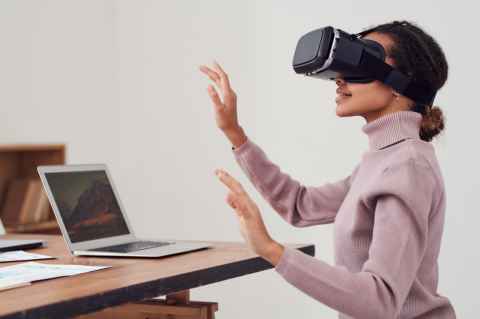Pilot Virtual Reality Intervention study for people who have completed cancer treatment
The aim of the study is to investigate whether a virtual reality (VR) experience that induces awe is a feasible and acceptable intervention for patients post-cancer treatment.

What's involved?
Additionally, the study will provide a preliminary indication of the extent to which the awe VR experience confers psychological and physical benefits. VR has mostly been applied as a distraction intervention during chemotherapy and painful procedures, and has been effective in reducing pain, anxiety, nausea, and fatigue. More recently, a nature-based VR experience was conducted for women with metastatic breast cancer. The study found preliminary indications of its benefits on anxiety, depression, pain, fatigue and other well-being domains. Awe is a complex emotion characterised by intense feelings of astonishment, wonder, and connectedness. Awe has the ability to broaden perspectives, which may have an adaptive function in the cancer context as patients can often become narrowly focused on the cancer experience. The current study will be the first to evaluate the possibility of an awe VR experience to produce benefits to the psychological and physical well-being of cancer patients as they navigate life after active treatment.
Participants will have either completed active treatment for cancer (surgery, chemotherapy, and radiotherapy) or are on long-term hormone treatment. Interested participants will be directed to contact the researcher, who will provide the participant information sheet and consent form. The researcher will explain the study requirements, answer any questions, and explain eligibility criteria before asking interested persons to complete the informed consent form. The research will be conducted at the Cancer Society, Domain Lodge, and the Clinical Research Centre, Grafton Campus, University of Auckland. Enrolled participants will all be exposed to the same awe VR experience. Participants will begin by completing a baseline questionnaire (T1). They will then listen to a brief recorded narrative about awe and then undergo a five-minute 360-degree nature-based VR experience that has been purposely designed to induce awe. This will be followed by completing a post-VR questionnaire (T2). Approximately one-week after their participation in the VR experience, participants will receive a follow-up phone interview from the researcher to gather in-depth feedback about their experience via a qualitative interview, and additionally will complete a follow-up questionnaire online (T3).
Participants will receive a $20 Countdown voucher after they complete the second set of questionnaires to recognise and thank them for their participation in this study.
Eligibility criteria
To participate in this study, you must:
- Have completed cancer treatment
- Be 18 years and older
- Be physically able to wear and tolerate the VR headset
- Be able to read, speak, or write in English
- Not have visual, hearing, and/or cognitive impairment that would limit the ability to provide informed consent, answer questionnaires, follow written instructions, and the use of VR
Contact details
Eleanor Feng
Department of Psychological Medicine
The University of Auckland
Email: efen477@aucklandunia.ac.nz
Dr. Geraldine Tennant
Department of Psychological Medicine
The University of Auckland
Phone: +64 9 923 1915
Email: g.tennant@auckland.ac.nz
Dr. Lisa Reynolds
Department of Psychological Medicine
The University of Auckland
Phone: +64 937 37599 Ext. 84938
Email: l.reynolds@auckland.ac.nz
Further information
Approved by the Auckland Health Research Ethics Committee on 18/05/2023 for three years.
Reference number AH25818.